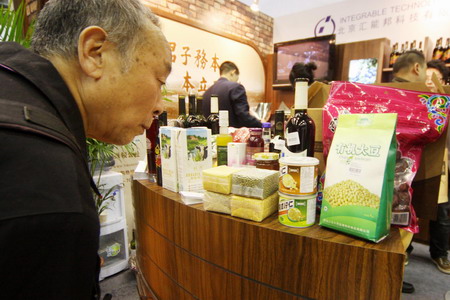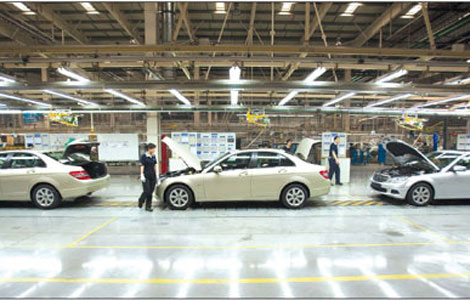Photos
Farmers aim to increase grain areas
Updated: 2011-03-18 09:18
By Zhou Siyu (China Daily)
|
 |
|
A booth at an international organic and green exposition in Beijing. China is aiming for an eighth consecutive year of increased agricultural production in 2011 to help keep increases in the price of food to a moderate and steady pace. [Photo / China Daily] |
It would be the second-largest expansion in grain-growing areas in five years, following an increase of only 2.1 percent in 2009, agricultural analysts said on Thursday.
The expansion will help stabilize rising food prices and rein in the high inflation rate in both the domestic and international markets, they said.
Hu Bingchuan, a researcher at the Rural Development Institute of the Chinese Academy of Social Sciences, credited the government's efforts to encourage grain farmers.
"Though the farmers' intention may not necessarily turn into reality, it does reflect their increasing interest," he said.
The area devoted to rice crops may gain by 1.9 percent year-on-year, while that of wheat remains comparatively unchanged, according to the results of the survey posted by the ministry on its website on Tuesday.
The area for cornfields may increase by 2.1 percent year-on-year, and cotton fields by 5.4 percent, the survey showed.
Meanwhile, the area devoted to the soybean crop is estimated to decline by 11.2 percent from last year, the ministry said.
Agricultural Minister Han Changfu said on March 10 that the country is aiming for an eighth consecutive year of increased agricultural production in 2011, and to keep food-price increases to a "moderate and steady pace".
In February, the government raised the minimum purchasing price for wheat by 6 percent year-on-year. The government purchasing price for three kinds of rice has also increased by more than 10 percent on average.
"China's self-sufficiency in grains will help ease the pressure to maintain adequate food supplies, and counter inflation expectations in the global food market," Hu said.
The Food and Agriculture Organization (FAO) Food Price Index, a measure of international food prices, surged for the eight consecutive month to a record 236 points.
| ||||
Ma Wenfeng, a senior analyst at Beijing Orient Agribusiness Consultant Ltd, one of the major consulting companies in China's agriculture sector, said he is concerned about the reduction in the country's domestic soybean yield.
"If China relies too much on imports, the country will have no control over the soybean trade," he said.
According to Hu, the net income for a hectare of soybeans is nearly half that of grains.
"This will prompt more farmers to grow grains instead of soybeans," he said.
China's soybean imports jumped by 6.1 percent year-on-year to 2.31 million tons in February.
In 2010, China's soybean imports rose to a record 54.8 million tons. Analysts predict that imports will exceed 60 million tons this year.
E-paper

Factory fever
Despite auto manufacturing bubble scare, car giants gear up expansion of factories.
Preview of the coming issue
Dressed for success
Fabric of change
Specials

Earthquake Hits Japan
A massive 8.8 magnitude quake hit the northeast coast of Japan on March 11,2011.

NPC & CPPCC sessions
Lawmakers and political advisers gather in Beijing to discuss major issues.

Slide: Japan quake
Devastating earthquake and tsunami left millions without water, electricity, homes or heat.




